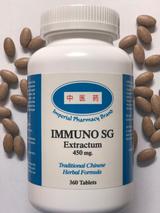CHINESE NAME: Ba Lan Gen (root), Da Qing Ye ( leaves)
LATIN NAME: Isatis Tintorio (root and leaves)
MEDICAL USE: Leukemia, Encephalitis, Erysipelas, Heat Rash, Inflammatory Conditions.
Indirubin is an active ingredient in the herbal Isatis Tintorio (root and leaves). Isatis Tintorio is an ingredient in herbal formulas used by Traditional Chinese Medicine (TCM) to treat patients with Chronic Myelogenous Leukemia (CML) and other leukemias and forms of cancer. This herbal medicine and many other TCM treatments are available in our clinic.
This medicinal herb has been used successfully in Traditional Chinese Medicine for thousands of years. Numerous new studies have demonstrated that Indirubin inhibits cyclin-dependent kinases in tumor cells. Indirubin has also anti-inflammatory effects in animals.
MECHANISM OF ACTION: Indirubin inhibits DNA synthesis in rats. Indirubin inhibits cell proliferation in the late-G1 and G2/M phase by selectively inhibiting cyclin-dependent kinases (CDK) through the interaction with the kinase's ATP-binding site. Indirubin may also play a role in inhibiting the assembly of microtubules, further reducing the rate of cell reproduction. Indirubin's anti-inflammatory effects appear to come from an inhibition of interferon-gamma. Indirubin is a minor constituent of Indigofera tinctoria, however a synthetic form of the substance was shown to have similar effectiveness against CML. See the following scientific references:
Back
REFERENCES:
(1) Marko D, Schatzle S, Friedel A, Genzlinger A, Zankl H, Meijer L et al. Inhibition of cyclin-dependent kinase 1 (CDK1) by Indirubin derivatives in human tumour cells Inhibition of cyclin-dependent kinase 1 (CDK1) by indirubin derivatives in human tumour cells Br.J Cancer 2001;84:283-9.
(2) Hoessel R, Leclerc S, Endicott JA, Nobel ME, Lawrie A, Tunnah P et al. Indirubin, the active constituent of a Chinese antileukemia medicine, inhibits cyclin-dependent kinases. Nat.Cell Biol. 1999;1:60-7.
(3) Kunikata T, Tatefuji T, Aga H, Iwaki K, Ikeda M, Kurimoto M. Indirubin inhibits inflammatory reactions in delayed-type hypersensitivity. Eur.J Pharmacol. 2000;410:93-100.
(4) Xiao Z, Hao Y, Liu B, Qian L. Indirubin and meisoindigo in the treatment of chronic myelogenous and other leukemia in China. Leuk.Lymphoma 2002;43:1763-8.
(5) Steriti R. Nutritional support for chronic myelogenous and other leukemias: a review of the scientific literature. Nutritional support for chronic myelogenous and other leukemias: a review of the scientific literature. Altern.Med Rev. 2002;7:404-9.
(6) Han R. Highlight on the studies of anticancer drugs derived from plants in China. Stem Cells 1994;12:53-63.
(7) Zhang JT. New drugs derived from medicinal plants. Therapie 2002;57:137-50.
Back







